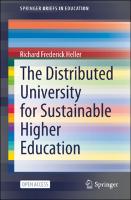 |
| The Distributed University for Sustainable Higher Education, Heller, 2022 |
After a very brief history of the university, Heller quickly jumps to diagnosing the problem today as managerialism. He provides an example from his own experience of at first being able to spend a grant as required, but then having increasing rules, committees, and procedures interposed. He then provides anecdotes to illustrate the problem of finances becoming a higher priority than educational outcomes, leading to competition between institutions, and duplication of effort.
None of the problems Heller catalogs are new. The priority for research over teaching is well known, as has been concern over pursuing fee from international students. Heller is also critical of the ‘sage on the stage’ form of teaching. What is unusual is the inclusion of the university's environmental footprint as a problem.
Unfortunately Heller's solutions are long on wishful thinking, and short on an understanding of the fallibility of academics. The first proposal is to trust academic staff, rather than impose professional management. However, I suggest that with trust goes responsibility. Academics are willing to require much study and testing of their students, but are they willing to undergo training and testing, to become certified in management techniques?
For the relatively simple management the average academic undertakes, a a Vocational Education certificate would be sufficient, but how many would be willing to do this? As a former public servant I have had in service training on how to manage projects, including how to do this within the law, and keep records. Unfortunately many academics seem to think they should be able to spent public money however they wish, not realizing this can get them arrested.
Heller's second solution is collaboration, within and between universities, as well as with industry. They suggest having collaboration as a learning outcome. Heller appears to be a little out of date, as this is already a common for professional qualifications. In computing, where I teach, we require students to work together on real projects for real clients, provide feedback to each other, and reflect on the experience. In teaching this over several years, it stuck me that these are skills which the average academic has never been trained in, or tested on.
To avoid duplication of effort, Heller proposes an "International Degree Program" for higher education, inspired by on the school International Baccalaureate. This would be available under a free under an open licence for universities to use. However, I don't see how this could be usable for all disciplines. There is already the Bologna Process to provide high level compatibility of qualifications, in the computing discipline, there is the Seoul Accord for accreditation of professional computing qualifications, and detailed global curricula guidelines from ACM/IEEE. But universities, or consortia of universities, customize how they teach to the curriculum. Even with a global discipline, such as computing, it would be difficult to have one standardized degree.
Heller's proposal to make use of volunteers as educators is problematic. Professionals may well be willing to assist with education. But they will need to meet the same standards as salaried staff. The burden this imposes was brought home to me this year, as after 20 years teaching, I was required to undertake new requirements to teach at a university. This has involved applying for a Working With Vulnerable People Card, undertaking a day of training on legal obligations, and a week training on teaching (even though I already have a Cert IV in T&A, a Graduate Certificate & a Master's of Education). Many professionals would be unwilling to undergo this additional training and testing, even with reimbursement of cost, without the prospect of payment.
With the suggestion that universities move to primarily online learning, Heller is five to ten years out of date. Even before the changes brought by COVID-19, most Australian university students were studying primarily online. The students were registered as on campus, & the university offered lectures, but most students did not attend. This uncomfortable truth was denied by university administrators, who would insist on booking a 100 seat room for an enrollment of 100 students, when they knew only 25 to 30 would actually turn up. When COVID-19 struck, universities suddenly "discovered" that they had almost everything needed for e-learning already. With two years experience of e-learning, even the most conservative of Australian universities are redesigning courses to better suit blended delivery in the long term.
Heller is unusual in including environmental issues, alongside funding and delivery methods of universities. Even more unusual Heller can back up his assertions with research, estimating e-learning saved about 8,000 kg CO2e per international student (Heller, Sun, Guo & Malik, 2022).
Environmental sustainability is talked about by some at universities, but tends to be management plans, without academic involvement. There are exceptions. When teaching an online course in ICT Sustainability, I was surprised to find a professional development student enroll from Canada. I was more surprised when they topped the class. This turned out to be the CIO of a Canadian university who was interested not only in improving the environmental footprint of their institution, but also teaching the course to their students.
Reference
Heller RF, Sun YY, Guo Z and Malik A. Impact on carbon emissions of online study for a cohort of overseas students: A retrospective cohort study [version 5; peer review: 2 approved, 1 approved with reservations]. F1000Research 2022, 10:849 (https://doi.org/10.12688/f1000research.55156.5)
Heller, Richard Frederick. The Distributed University for Sustainable Higher Education. Springer, 2022. URL https://link.springer.com/book/10.1007/978-981-16-6506-6
No comments:
Post a Comment